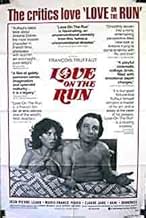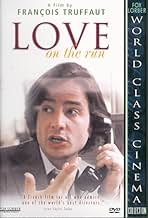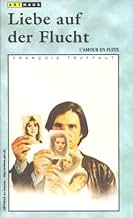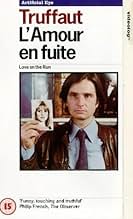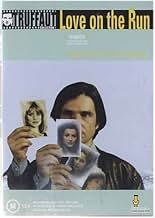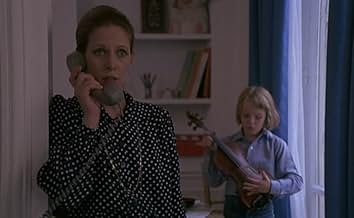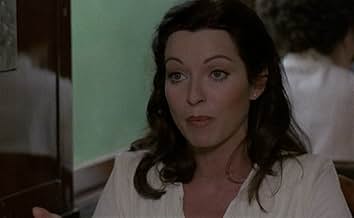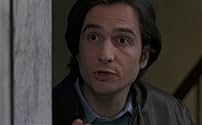VALUTAZIONE IMDb
7,0/10
7904
LA TUA VALUTAZIONE
Ora sulla trentina, Antoine Doinel ripensa al suo passato mentre la sua coppia crolla, indebolita dall'infedeltà e dalla promessa di una nuova passione.Ora sulla trentina, Antoine Doinel ripensa al suo passato mentre la sua coppia crolla, indebolita dall'infedeltà e dalla promessa di una nuova passione.Ora sulla trentina, Antoine Doinel ripensa al suo passato mentre la sua coppia crolla, indebolita dall'infedeltà e dalla promessa di una nuova passione.
- Regia
- Sceneggiatura
- Star
- Premi
- 1 vittoria e 1 candidatura in totale
Jean-Pierre Léaud
- Antoine Doinel
- (as Jean-Pierre Leaud)
Dorothée
- Sabine Barnérias
- (as Dorothee)
Recensioni in evidenza
True, there are a bit too much flash back in the film (with some lengthy ones,too), but after the previous four Antoine Doinel films, this last installment brings so much sentiment and feeling that is quite unique and unmatched in any other films. Whether Antoine's life will change or not, nobody can tell. The important thing is, he has to face the reality this time. He's no longer young, plus he's a divorced father and struggling writer (what a combination!). Yet as all the people around him changed, Antoine still has the child-like energy and belief in love. That's what makes him so attractive as a protagonist in FIVE films. Truffaut really gave us film lovers a great gift. Too bad that he died in 1984, or we might have a 6th or 7th film on Antoine Doinel!
Antoine Doinel (Jean-Pierre Léaud) is having a love affair with the vinyl seller Colette Tazzi (Marie-France Pisier). After five years of a troubled marriage with separations, Antoine and Christine Doinel (Claude Jade) have a private audience with the judge (Marie Henriau) and conclude an amicable divorce process. His former sweetheart and presently lawyer Colette Tazzi (Marie-France Pisier) sees Antoine leaving the court and she goes to a bookstore to buy his autobiographical novel that was published a couple of years ago. When Antoine goes with Alphonse (Julien Dubois) to the train station for the travel vacation of his son, he sees Colette in another train and he jumps from the platform to the train and travels with her. They recall their adolescent love and disclose their sentimental relationships; but when Colette tells how she raises money for her self-support, Antoine is disappointed and seeks out Sabine.
"L'Amour en Fuite" is the conclusion of the sentimental saga of the character Antoine Doinel, the insecure alter ego of François Truffaut that began in "Les Quatre Cents Coups" and followed through "L'Amour à Vingt Ans", "Baisers Volés" and "Domicile Conjugal", inclusive with the use of scenes in the many flashbacks of these movies with his recollections and troubled love affairs. This character has an evolution from the needy fourteen years old boy rejected by his mother and his stepfather in the first movie. The lack of affection at home makes him a rebel, bad student, liar, reckless and a thief stealing objects and money at home in his adolescence. In the next movies, he grows-up, but with a fragile emotional structure and the viewer sees an unstable man incapable of having a steady relationship or commitment with the many beautiful women that he meets along his futile life. My vote is seven.
Title (Brazil): "O Amor em Fuga" ("The Love on the Run")
"L'Amour en Fuite" is the conclusion of the sentimental saga of the character Antoine Doinel, the insecure alter ego of François Truffaut that began in "Les Quatre Cents Coups" and followed through "L'Amour à Vingt Ans", "Baisers Volés" and "Domicile Conjugal", inclusive with the use of scenes in the many flashbacks of these movies with his recollections and troubled love affairs. This character has an evolution from the needy fourteen years old boy rejected by his mother and his stepfather in the first movie. The lack of affection at home makes him a rebel, bad student, liar, reckless and a thief stealing objects and money at home in his adolescence. In the next movies, he grows-up, but with a fragile emotional structure and the viewer sees an unstable man incapable of having a steady relationship or commitment with the many beautiful women that he meets along his futile life. My vote is seven.
Title (Brazil): "O Amor em Fuga" ("The Love on the Run")
Love on the Run (1979), the closing chapter in François Truffaut's celebrated series of films focusing on the character of Antoine Doinel; a near-iconic figure in French cinema brought vividly to life by the always great Jean-Pierre Léaud. Here, the actors injects the part with his usual nervous charm and cocky likability, though it is clear that character of Antoine is , still as uncertain about life, love and fidelity as ever before. On a Structural level, the film is built around Antoine's divorce from his wife Christine - with the reappearance of Claude Jade from Stolen Kisses (1968) and Bed and Board (1970) - inter-cut with flashbacks to early escapades from Antoine's presented in the style of a clip show.
This particular stylistic device does set up a sense of familiarity for new viewers, however; with such a slight plot, the flashbacks end up becoming the most interesting part of the movie, with what little new footage there is so repetitive that it feels like you're watching the same scene over and over again. In fact, the film is so hastily put together that it looks like Truffaut is desperate to get the series finished and out of the way, so that he can finally move on with the more progressive work that he was attempting with films like The Green Room (1979) and The Last Metro (1980).
Still, the film can sometimes be charming and the actors are all on fine form, but the whole thing seems lacking somewhat; with the use of repeated imagery and scenes cut and pasted from the previous films making this feel too much like a retread rather than a radical re-interpretation. For me, the film just seems empty, deflated and somehow lacking the allure, beauty and sophistication that was always synonymous with Truffaut's work or at least the films of his that I am familiar with. For me, Love on the Run was something of a slight, disappointing and unimaginative film that failed to inspire me in the way I had initially hoped.
This particular stylistic device does set up a sense of familiarity for new viewers, however; with such a slight plot, the flashbacks end up becoming the most interesting part of the movie, with what little new footage there is so repetitive that it feels like you're watching the same scene over and over again. In fact, the film is so hastily put together that it looks like Truffaut is desperate to get the series finished and out of the way, so that he can finally move on with the more progressive work that he was attempting with films like The Green Room (1979) and The Last Metro (1980).
Still, the film can sometimes be charming and the actors are all on fine form, but the whole thing seems lacking somewhat; with the use of repeated imagery and scenes cut and pasted from the previous films making this feel too much like a retread rather than a radical re-interpretation. For me, the film just seems empty, deflated and somehow lacking the allure, beauty and sophistication that was always synonymous with Truffaut's work or at least the films of his that I am familiar with. For me, Love on the Run was something of a slight, disappointing and unimaginative film that failed to inspire me in the way I had initially hoped.
This is the fifth and last part of Francois Truffauts Antoine Doinel cycle, a biographical movie series about the growing up of a romantic Parisian, played by Jean Pierre Leaud all the time, and all his struggles with love and life which was produced over a period of 20 years.
This last part from 1978 shows us Doinel doing what he's also doing in the previous four parts - falling in love with numerous women, trying to keep up relationships, looking for love, flirting etc. While the first part from 1959 showed us Doinel's childhood in a poor family with a hard and beating father and his longing for respect and love, the following parts are less interesting in my opinion.
The final chapter is rather superfluous, with jokes falling flat, no real script, no suspense or a really interesting story line, and the actors are just running around most of the time. If you have watched the previous Doinel films it might be interesting to see this sequel (which is not really an end), but I suggest you to watch the first Doinel movie "Les 400 coups" ("The 400 Blows") instead, or Truffauts "L'homme qui l'amait les femmes" ("The Man Who Loved Women"), a far more interesting study on love, obsession and fetishism.
This last part from 1978 shows us Doinel doing what he's also doing in the previous four parts - falling in love with numerous women, trying to keep up relationships, looking for love, flirting etc. While the first part from 1959 showed us Doinel's childhood in a poor family with a hard and beating father and his longing for respect and love, the following parts are less interesting in my opinion.
The final chapter is rather superfluous, with jokes falling flat, no real script, no suspense or a really interesting story line, and the actors are just running around most of the time. If you have watched the previous Doinel films it might be interesting to see this sequel (which is not really an end), but I suggest you to watch the first Doinel movie "Les 400 coups" ("The 400 Blows") instead, or Truffauts "L'homme qui l'amait les femmes" ("The Man Who Loved Women"), a far more interesting study on love, obsession and fetishism.
Seeking a sure-fire money maker after a commercial failure, Francois Truffaut reunited with his mascot, Antoine Doinel to help him move past some of the recent negativity he had experienced in his career.
Banking on a fast shoot, only a 28-day filming schedule, Francois Truffaut imagined that a final collaboration with Jean-Pierre Léaud, as his character Antoine Doinel, would perfectly illustrate the "mosaic of life." Truffaut went into Love on the Run needing to make money for his production company after suffering a financial loss with his much later appreciated masterpiece, The Green Room. There were a number of other projects dear to Truffaut's heart that he had wanted to pursue at the time, but as a means to save his company, he put his energy into a previously unplanned Antoine Doinel finale. Truffaut was never happy with the script of Love on the Run, hating it from its earliest conception. Despite his attempts to pivot his energy, he was not happy with being in the situation, feeling forced to take the project on. Love on the Run was a commercial success, but Truffaut was never happy with it. Still, Truffaut was emotionally connected to Antoine Doinel and saddened to say goodbye to the character that launched his career.
After five years of separation and reconciliation, Antoine (Jean-Pierre Léaud) and Christine (Claude Jade) have finally decided to divorce. They have reached the decision amicably, and are committed to maintaining a healthy relationship post-divorce. Upon leaving the courtroom, Antoine is seen by his former flame, Colette, (Marie-France Pisier) who now works as a lawyer. Intrigued by her chance glance at Antoine, Colette picks up a copy of his autobiography interested to see what has become of the young man that so desperately chased her heart years before. Antoine has been having a casual relationship with a record store clerk, Sabine Barnerias (Dorothée) contemplating whether or not to become more serious in his intentions with her. Sabine, deeply in love and committed to Antoine was put off by his neutral stance in their relationship and informs him that she may be interested in dating other people. Never one to appreciate being backed into a corner, Antoine leaves Sabine's in an unhappy hurry to pick up his son. While taking Alphonse to the train station to send him off for the summer, Antoine sees Colette and jumps onto the platform eager to be reunited with her. The two have a nice time reminiscing about their adolescent love and telling each other about the relationships they have had since they last saw each other. Finding himself in another dilemma in love, Antoine must decide between pursuing a relationship with one of the women, or remaining alone and focusing on career and fatherhood.
The Adventures of Antoine Doinel, the five-film collection depicting a version of Truffaut, was written by him and inspired by events in his life, making them a personal and deeply affecting anthology. Truffaut's willingness to inject so much of himself into each of his films, but especially those in the Antoine Doinel series, make them endlessly thought-provoking. Driven by Truffaut and his life, the films communicate so well with audiences, in no small part, thanks to the expert casting of Jean-Pierre Léaud. His playful yet searching disposition lent itself well to the perpetually unsatisfied Antoine Doinel. The part of Antoine needed to be brought to life by someone who could embody a boyish charm with immeasurable charisma, and Truffaut found exactly that combination in Jean-Pierre Léaud. Along with the exceptional casting, Truffaut's particular film style created an engaging an extraordinarily fun time with the character closest to his heart. Love on the Run is filled with flashbacks reminding the audience of Antoine's progression and highlighting the ups and downs with the loves of his life. The intercutting of Truffaut's previous films in the series was a brilliant device to use for an anthology wherein many years passed between one film and the next. Many have criticised Love on the Run due to its reliance on flashbacks, but I can't imagine a better way to understand Antoine's growth and development as a person. Seeing the scenes from his troubled relationship with love and his searching for a family and acceptance allows the audience to best understand Antoine as a person. I suppose ones ultimate opinion on Love on the Run will likely depend on how you feel about the number of flashbacks used in the film, for me, they work perfectly and Truffaut works them in perfectly. Not a single scene feels out of place or unnecessary, again proving Truffaut's exceptional intuition as a filmmaker. Even in 1979, long after Truffaut was first accused of abandoning the movement he ushered in and giving up on doing anything different within the medium of cinema, he affirmed he was not done taking chances. His confidence boosted by talking to Colette, Antoine shares with her the premise of his next book, a novel that was inspired by an episode he witnessed while waiting outside of a phone booth. The scene takes place with Antoine and Colette on the train and shows him reminiscing about the incident he saw wherein an angry man ripped apart a photo while yelling at someone on the phone. As Antoine tells the story, the version of himself in the flashback suddenly becomes cognizant that he is in a flashback, and he addresses the camera by brilliantly breaking the fourth wall. The scene is playful, in line with Antoine's character, and done in an experimental way to engage the audience and show that Truffaut had not strayed from his early intentions in filmmaking. That phone booth scene is such a perfectly quirky scene it is my favorite in an already stellar feature.
Forever the humanist, Francois Truffaut beautifully explored love and what it's like to finally accept the end of once-nurtured devotion. Complicated mixed feelings emerge anytime people go through a divorce, especially when they have put so many years into a hopeful reconciliation. Antoine and Christine share a child together and the memories of their life together before their son were born and their elation at bringing him into the world plays into their emotional state, as well. Truffaut takes us, using flashbacks, through the depths of their most committed love, the pain and heartbreak of betrayal, and their eventual decision to leave each other. Just as in Ingmar Bergman's Scenes from a Marriage, Antoine and Christine can't stay hateful or bitter to the other, despite the unfaithfulness that took place. It is clear that the couple has a genuine love for each other that will not be distinguished by divorce. They have a palpable affection, and will always be invested in the best interest of the other. In addition to his humanism, another aspect of Francois Truffaut's filmmaking that I appreciate are the autobiographical elements in each of his films. There is a moment where Antoine confesses that many don't think of him as a true writer because he has only written about experiences from his own life. He goes on to admit that he has faced criticism that suggests he is only capable of drawing from personal experiences in a transparent and conscious way. This seems to be Truffaut addressing those that had attacked him in a similar way for the personal elements found in his own art. Much to the contrary, however, those that so freely open the personal wounds from their own life to the criticisms of the masses are connected to their art in a much deeper way because it is in the truest sense a part of them. Truffaut's commitment to the cinema cannot be questioned and his personal approach in developing a relationship with filmmaking only gives his films a deeper resonance. It's impossible to tire of the individual films provided by Francois Truffaut, I only regret that there are not more to see.
Banking on a fast shoot, only a 28-day filming schedule, Francois Truffaut imagined that a final collaboration with Jean-Pierre Léaud, as his character Antoine Doinel, would perfectly illustrate the "mosaic of life." Truffaut went into Love on the Run needing to make money for his production company after suffering a financial loss with his much later appreciated masterpiece, The Green Room. There were a number of other projects dear to Truffaut's heart that he had wanted to pursue at the time, but as a means to save his company, he put his energy into a previously unplanned Antoine Doinel finale. Truffaut was never happy with the script of Love on the Run, hating it from its earliest conception. Despite his attempts to pivot his energy, he was not happy with being in the situation, feeling forced to take the project on. Love on the Run was a commercial success, but Truffaut was never happy with it. Still, Truffaut was emotionally connected to Antoine Doinel and saddened to say goodbye to the character that launched his career.
After five years of separation and reconciliation, Antoine (Jean-Pierre Léaud) and Christine (Claude Jade) have finally decided to divorce. They have reached the decision amicably, and are committed to maintaining a healthy relationship post-divorce. Upon leaving the courtroom, Antoine is seen by his former flame, Colette, (Marie-France Pisier) who now works as a lawyer. Intrigued by her chance glance at Antoine, Colette picks up a copy of his autobiography interested to see what has become of the young man that so desperately chased her heart years before. Antoine has been having a casual relationship with a record store clerk, Sabine Barnerias (Dorothée) contemplating whether or not to become more serious in his intentions with her. Sabine, deeply in love and committed to Antoine was put off by his neutral stance in their relationship and informs him that she may be interested in dating other people. Never one to appreciate being backed into a corner, Antoine leaves Sabine's in an unhappy hurry to pick up his son. While taking Alphonse to the train station to send him off for the summer, Antoine sees Colette and jumps onto the platform eager to be reunited with her. The two have a nice time reminiscing about their adolescent love and telling each other about the relationships they have had since they last saw each other. Finding himself in another dilemma in love, Antoine must decide between pursuing a relationship with one of the women, or remaining alone and focusing on career and fatherhood.
The Adventures of Antoine Doinel, the five-film collection depicting a version of Truffaut, was written by him and inspired by events in his life, making them a personal and deeply affecting anthology. Truffaut's willingness to inject so much of himself into each of his films, but especially those in the Antoine Doinel series, make them endlessly thought-provoking. Driven by Truffaut and his life, the films communicate so well with audiences, in no small part, thanks to the expert casting of Jean-Pierre Léaud. His playful yet searching disposition lent itself well to the perpetually unsatisfied Antoine Doinel. The part of Antoine needed to be brought to life by someone who could embody a boyish charm with immeasurable charisma, and Truffaut found exactly that combination in Jean-Pierre Léaud. Along with the exceptional casting, Truffaut's particular film style created an engaging an extraordinarily fun time with the character closest to his heart. Love on the Run is filled with flashbacks reminding the audience of Antoine's progression and highlighting the ups and downs with the loves of his life. The intercutting of Truffaut's previous films in the series was a brilliant device to use for an anthology wherein many years passed between one film and the next. Many have criticised Love on the Run due to its reliance on flashbacks, but I can't imagine a better way to understand Antoine's growth and development as a person. Seeing the scenes from his troubled relationship with love and his searching for a family and acceptance allows the audience to best understand Antoine as a person. I suppose ones ultimate opinion on Love on the Run will likely depend on how you feel about the number of flashbacks used in the film, for me, they work perfectly and Truffaut works them in perfectly. Not a single scene feels out of place or unnecessary, again proving Truffaut's exceptional intuition as a filmmaker. Even in 1979, long after Truffaut was first accused of abandoning the movement he ushered in and giving up on doing anything different within the medium of cinema, he affirmed he was not done taking chances. His confidence boosted by talking to Colette, Antoine shares with her the premise of his next book, a novel that was inspired by an episode he witnessed while waiting outside of a phone booth. The scene takes place with Antoine and Colette on the train and shows him reminiscing about the incident he saw wherein an angry man ripped apart a photo while yelling at someone on the phone. As Antoine tells the story, the version of himself in the flashback suddenly becomes cognizant that he is in a flashback, and he addresses the camera by brilliantly breaking the fourth wall. The scene is playful, in line with Antoine's character, and done in an experimental way to engage the audience and show that Truffaut had not strayed from his early intentions in filmmaking. That phone booth scene is such a perfectly quirky scene it is my favorite in an already stellar feature.
Forever the humanist, Francois Truffaut beautifully explored love and what it's like to finally accept the end of once-nurtured devotion. Complicated mixed feelings emerge anytime people go through a divorce, especially when they have put so many years into a hopeful reconciliation. Antoine and Christine share a child together and the memories of their life together before their son were born and their elation at bringing him into the world plays into their emotional state, as well. Truffaut takes us, using flashbacks, through the depths of their most committed love, the pain and heartbreak of betrayal, and their eventual decision to leave each other. Just as in Ingmar Bergman's Scenes from a Marriage, Antoine and Christine can't stay hateful or bitter to the other, despite the unfaithfulness that took place. It is clear that the couple has a genuine love for each other that will not be distinguished by divorce. They have a palpable affection, and will always be invested in the best interest of the other. In addition to his humanism, another aspect of Francois Truffaut's filmmaking that I appreciate are the autobiographical elements in each of his films. There is a moment where Antoine confesses that many don't think of him as a true writer because he has only written about experiences from his own life. He goes on to admit that he has faced criticism that suggests he is only capable of drawing from personal experiences in a transparent and conscious way. This seems to be Truffaut addressing those that had attacked him in a similar way for the personal elements found in his own art. Much to the contrary, however, those that so freely open the personal wounds from their own life to the criticisms of the masses are connected to their art in a much deeper way because it is in the truest sense a part of them. Truffaut's commitment to the cinema cannot be questioned and his personal approach in developing a relationship with filmmaking only gives his films a deeper resonance. It's impossible to tire of the individual films provided by Francois Truffaut, I only regret that there are not more to see.
Lo sapevi?
- QuizThe flashback of Liliane and Antoine arguing is, in fact, a clip from Effetto notte (1973), in which both also played lovers despite the film not being part of Antoine Doinel saga.
- BlooperAccording to her grave, Antoine Doinel's Mother, Gilberte, died in 1971. According to the conversation Antoine has with her ex-lover five minutes before, she died in 1968 (while Antoine was in the army, in the beginning of "Baisers Volés").
- Citazioni
[English subtitled version]
Antoine Doinel: [to Alphonse as he is about to head off to music camp] If you practice hard, you'll be a great musician.
Alphonse Doinel: What if I don't?
Antoine Doinel: If you don't, you'll wind up a music critic.
- Curiosità sui creditiDuring the opening credits, when the "Screenplay" ("Scenario de") credit appears on the screen, in the background a faded white "X" appears for a frame; also, there is a clapper on the left-hand side of the screen (for several seconds) before being pulled off screen.
I più visti
Accedi per valutare e creare un elenco di titoli salvati per ottenere consigli personalizzati
- How long is Love on the Run?Powered by Alexa
Dettagli
Botteghino
- Lordo Stati Uniti e Canada
- 509 USD
- Fine settimana di apertura Stati Uniti e Canada
- 11.206 USD
- 25 apr 1999
- Lordo in tutto il mondo
- 509 USD
- Tempo di esecuzione
- 1h 34min(94 min)
- Colore
- Mix di suoni
- Proporzioni
- 1.66 : 1
Contribuisci a questa pagina
Suggerisci una modifica o aggiungi i contenuti mancanti

![Guarda Bande-annonce [OV]](https://m.media-amazon.com/images/M/MV5BZmU4NzU4Y2EtODg1ZS00NmVjLTlhOTItYWY2YmE0NTdlMDlhXkEyXkFqcGdeQXRyYW5zY29kZS13b3JrZmxvdw@@._V1_QL75_UX500_CR0)
